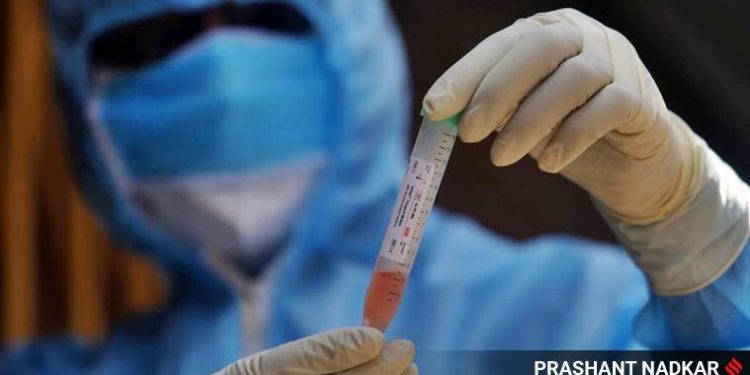- State Government had decreased the cost of RT-PCR testing from ₹2,400 to ₹1,600 on 29 August.
- It further dropped the prices from ₹1,600 to ₹1,200 on 4 September
- Walk-in testing in both government and private labs have increased the number of testing.
THD NewsDesk, Gurugram: On Friday, the Haryana government decreased the price for RT-PCR testing. It is the gold standard for detecting Sars-CoV-2 virus that causes Covid-19. The price dropped from ₹1,600 to ₹1,200.
The Haryana government has dropped the price for testing for the second time. The prices dwindled through the reverse transcription-polymerase chain reaction at private laboratories. On August 29, the State Government had decreased the cost of RT-PCR testing from ₹2,400 to ₹1,600.
The Department of Health and Family Welfare published an amended order declaring that the total price for taking an RT-PCR test, was reduced. It has considered the cost of kits and consumables and the approval of the leading private laboratories. The order read, “No private laboratory should charge any amount more than ₹1,200 for RT-PCR. It includes the cost of sample pick up, packing, transportation of samples, documentation and reporting.”
Rajeev Arora, Additional Chief Secretary Health Department, stated “We are continuously observing the cost of inputs for testing and keep aligning our rates. Haryana was the first state to cap the RT-PCR test price to ₹2,400 (in June) and then reduce it to ₹1,600 and now to ₹1,600. This is the lowest charge in the region.”
The costs of antigen and antibody testing at private labs are still the same. In Haryana, the rapid antigen test costs ₹650, while antibody test ₹250.
Rishabh Rajput, Director of Covid-19 and Microbiology Division, Modern Diagnostics, an Indian Council of Medical Research (ICMR) certified lab for Covid-19 testing in Gurugram, said “The reduced RT-PCR testing price can compromise the quality assurance of the tests in smaller labs. Laboratories were earning a margin of 15-20 per cent by administering RT-PCR at the previous cost of ₹1,600. This margin will further reduce especially when labs are sending their technicians to collect samples from homes. The new price slab will not impact big labs.”
Dr Virender Yadav, Chief Medical Officer, said “The health department has been collecting around 1,000 samples daily on an average for RT-PCR testing. In private labs too, the footfall is high. Bringing down the testing cost would mean increased footfall in private labs, especially when getting a test without a doctor’s prescription now allowed.”
On Friday, in Gurugram, at least 2,161 RT-PCR tests were conducted while 901 tests with rapid antigen tests. According to the data from the District Health Department currently, 2,65, 937 specimens have been collected from Gurugram, of which over one lakh tests were through antigen detection kit.
In a report published by the Hindustan Times, on September 24, the quantity of RT-PCR samples in the city has diminished to nearly 1,000. It is even below that number with government facilities. Statistics show that with walk-in testing permitted from September 8, both government and private labs have observed a rise in testing number. On September 14, the District Health Department had conducted 1,900 RT-PCR tests recorded as the highest number in a single day.
Considering the heterogeneity of economic classes in India, the affordable rates of testing will be a ray of hope for the masses. With the consecutive reduction in the prices of the RT-PCR testing, the battle with the pandemic might be less daunting.
























